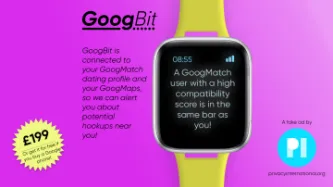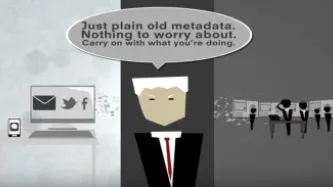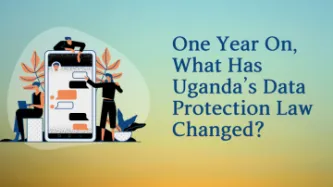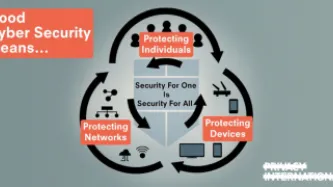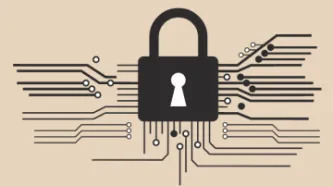Advanced Search
Content Type: News & Analysis
Name: Google/Fitbit mergerAge: GestatingAppearance: A bit dodgy. One of the world’s biggest tech giants, trying to purchase a company that makes fitness tracking devices, and therefore has huge amounts of our health data.I don’t get it. Basically Google is trying to buy Fitbit. As if Google doesn’t already have enough data about us, it now wants huge amounts of health data too.Oh, Fitbit, that’s that weird little watch-type-thing that people get for Christmas, wear for about a month while they…
Content Type: Call to Action
Google wants to know everything about you.It already holds a massive trove of data about you, but by announcing its plans to acquire the health and fitness tracker company Fitbit, it now clearly wants to get its hands on your health too. We don’t think any company should be allowed to accumulate this much intimate information about you. This is why we’re trying to stop its merger with Fitbit.Google and Fitbit need the European Commission’s approval before they can merge. The merger would have…
Content Type: Call to Action
You might have read our investigation into advertisers who upload your data on Facebook and found out some companies doing the same to you. Well, you can join us and hold them accountable by sending your own Data Subject Access Request (DSAR)!Before you get started we suggest you read our FAQ and take a look at our 7+1 tips to make the most out of your DSAR before and after.To do so you simply need to copy the message bellow and send it to the companies that uploaded your data despite…
Content Type: Report
Back in October 2019, PI started investigating advertisers who uploaded personal data to Facebook for targeted advertising purposes. We decided to take a look at "Advertisers Who Uploaded a Contact List With Your Information", a set of information that Facebook provides to users about advertisers who upload files containing their personal data (including unique identifier such as phone numbers, emails etc...). Looking at the limited and often inaccurate information provided by Facebook through…
Content Type: Explainer
In a scramble to track, and thereby stem the flow of, new cases of COVID-19, governments around the world are rushing to track the locations of their populace.
In this third installment of our Covid-19 tracking technology primers, we look at Satellite Navigation technology. In Part 1 of our mini-series on we discussed apps that use Bluetooth for proximity tracking. Telecommunications operators ('telcos'), which we discussed in Part 2, are also handing over customer data, showing the cell towers…
Content Type: News & Analysis
This week International Health Day was marked amidst a global pandemic which has impacted every region in the world. And it gives us a chance to reflect on how tech companies, governments, and international agencies are responding to Covid-19 through the use of data and tech.
All of them have been announcing measures to help contain or respond to the spread of the virus; but too many allow for unprecedented levels of data exploitation with unclear benefits, and raising so many red flags…
Content Type: Explainer
In a scramble to track, and thereby stem the flow of, new cases of Covid-19, Governments around the world are rushing to track the locations of their populace. One way to do this is to write a smartphone app which uses Bluetooth technology, and encourage (or mandate) that individuals download and use the app. We have seen such examples in Singapore and emerging plans in the UK.
Apps that use Bluetooth are just one way to track location. There are several different technologies in a smartphone…
Content Type: News & Analysis
In the last few days, PI and its Network have been recording and documenting the measures being proposed by various governments, international institutions and companies to help contain the spread of Covid-19.
In a recent development, the Guardian have reported that the UK government is the latest to seek to use mobile phone location and other traffic data from telecommunication operators to help with measures the government may develop next as part of the response to Covid-19.
It comes…
Content Type: News & Analysis
This piece was originally published by Unwanted Witness here.
Today marks exactly one year since Uganda passed its data protection law, becoming the first East African country to recognize privacy as a fundamental human right, as enshrined in Art 27 of the 1995 Uganda Constitution as well as in regional and International laws.
The Data Protection and Privacy Act, 2019 aims to protect individuals and their personal data by regulating processing of personal information by state and non-state…
Content Type: Long Read
This piece was written by Aayush Rathi and Ambika Tandon, who are policy officers at the Centre for Internet and Society (CIS) in India. The piece was originally published on the website Economic Policy Weekly India here.
In order to bring out certain conceptual and procedural problems with health monitoring in the Indian context, this article posits health monitoring as surveillance and not merely as a “data problem.” Casting a critical feminist lens, the historicity of surveillance practices…
Content Type: Examples
Recent study shows that Americans are wary of data from smart speakers being used in criminal investigations, the Pew Research Center reported. A recent study showed that 49% of Americans answered that it is unacceptable for smart speakers companies to share audio recordings of their customers with law enforcement in order to help with criminal investigations. Only 25% said it is acceptable. Aparently, this result contrasts with some other data use practices measured in the same survey. For…
Content Type: Long Read
We are excited to spotlight our Reproductive Rights and Privacy Project!
The Project is focused on researching and exposing organisations that collect and exploit the information of those seeking to exercise their reproductive rights. Working together with PI partners, other international grassroots organisations and NGOs, PI is researching and advocating against this data exploitation.
So, what are reproductive rights?
Sexual and reproductive rights, which are contained within Economic,…
Content Type: News & Analysis
In the last few months strong concerns have been raised in the UK about how police use of mobile phone extraction dissuades rape survivors from handing over their devices: according to a Cabinet Office report leaked to the Guardian, almost half of rape victims are dropping out of investigations even when a suspect has been identified. The length of time it takes to conduct extractions (with victims paying bills whilst the phone is with the police) and the volume of data obtained by the…
Content Type: Examples
A woman was killed by a spear to the chest at her home in Hallandale Beache, Florida, north of Miami, in July. Witness "Alexa" has been called yet another time to give evidence and solve the mystery. The police is hoping that the smart assistance Amazon Echo, known as Alexa, was accidentally activated and recorded key moments of the murder. “It is believed that evidence of crimes, audio recordings capturing the attack on victim Silvia Crespo that occurred in the main bedroom … may be found on…
Content Type: Long Read
The pressing need to fix our cybersecurity (mis)understandings
Despite all the efforts made so far by different, cybersecurity remains a disputed concept. Some states are still approving cybersecurity laws as an excuse to increase their surveillance powers. Despite cybersecurity and cybercrime being different concepts, the confusion between them and the broad application of criminal statutes is still leading to the criminalise legitimate behaviour.
All of this represents a sizable challenge…
Content Type: Long Read
In this piece we examine mobile phone extraction, relying on publicly available information and Privacy International’s experience from conducting mobile phone extraction using a Cellebrite UFED Touch 2. We welcome input from experts in the field. This is a rapidly developing area. Just as new security features are announced for phones, so too new methods to extract data are found.
[All references can be found in the pdf version below.]
General explanation of mobile phone…
Content Type: News & Analysis
Photo by Daniel Jensen on Unsplash
Everyone is talking about Facebook's end-to-end encryption plans and the US, UK and Australian government's response. Feeling lost? Here is what you need to know.
What's Facebook trying to do?
First let's be clear: Facebook has many faults when it comes to privacy. It's also suffered a number of security failures recently. See here for instance.
In response to their successive failures to protect your privacy, Facebook announced in their 'pivot to privacy…
Content Type: News & Analysis
Today’s announcement regarding the UK and US agreement signed pursuant to the US CLOUD Act is being touted on both sides of the Atlantic as a major victory for law enforcement and security. But it is a step backward for privacy.
And it’s far more complicated than their press release and letter to industry.
The agreement replaces the prior system, under which law enforcement agencies from around the world, including the UK, had to meet US legal standards in order to get access to content held…
Content Type: Long Read
In December 2018, Privacy international exposed the dubious practices of some of the most popular apps in the world.Out of the 36 apps we tested, we found that 61% automatically transfer data to Facebook the moment a user opens the app. This happens whether the user has a Facebook account or not, and whether they are logged into Facebook or not. We also found that some of those apps routinely send Facebook incredibly detailed and sometimes sensitive personal data. Again, it didn’t matter if…
Content Type: Long Read
Image credit: Emil Sjöblom [ShareAlike 2.0 Generic (CC BY-SA 2.0)]
Prepaid SIM card use and mandatory SIM card registration laws are especially widespread in countries in Africa: these two factors can allow for a more pervasive system of mass surveillance of people who can access prepaid SIM cards, as well as exclusion from important civic spaces, social networks, and education and health care for people who cannot.
Mandatory SIM card registration laws require that people provide personal…
Content Type: Video
Watch our video primer (1m54s) on how political advertisers use highly detailed data about you to target political adverts at you.
Read about some simple steps you can take to minimise the amount of political ads you see online and questions you can be asking of those that profit from your data.
Content Type: Examples
Cookies and other tracking mechanisms are enabling advertisers to manipulate consumers in new ways. For $29, The Spinner will provide a seemingly innocent link containing an embedded cookie that will allow the buyer to deliver targeted content to their chosen recipient. The service advertises packages aimed at men seeking to influence their partners to initiate sex, people trying to encourage disliked colleagues to seek new jobs, and teens trying to get their parents to get a dog. However,…
Content Type: Impact Case Study
What HappenedOn 5 June 2013, The Guardian published the first in a series of documents disclosed by Edward Snowden, a whistleblower who had worked with the NSA. The documents revealed wide-ranging mass surveillance programs conducted by the USA’s National Security Agency (NSA) and the UK’s Government Communications Headquarters (GCHQ), which capture the communications and data of hundreds of millions of people around the world. In addition to revealing the mass surveillance programs of the NSA…
Content Type: Examples
In July 2018, Dutch researcher Foeke Postma discovered that Polar, the manufacturer of the world's first wireless heart rate monitor manufacturer, was exposing the heart rates, routes, dates, times, duration, and pace of exercises performed by individuals at military sites and at their homes via its social platform, Polar Flow. Polar placed these individuals at particular risk by showing all the exercises a particular individual has completed since 2014 on a single global map. Postma was able…
Content Type: Examples
In April 2018, the Austrian cabinet agreed on legislation that required asylum seekers would be forced to hand over their mobile devices to allow authorities to check their identities and origins. If they have been found to have entered another EU country first, under the Dublin regulation, they can be sent back there. The number of asylum seekers has dropped substantially since 2016, when measures were taken to close the Balkan route. The bill, which must pass Parliament, also allows the…
Content Type: Examples
In October 2018 Amazon patented a new version of its Alexa virtual assistant that would analyse speech to identify signs of illness or emotion and offer to sell remedies. The patent also envisions using the technology to target ads. Although the company may never exploit the patent, the NHS had previously announced it intended to make information from its online NHS Choices service available via Alexa.
https://www.telegraph.co.uk/technology/2018/10/09/amazon-patents-new-alexa-feature-knows-…
Content Type: Examples
In a 2018 interview, the Stanford professor of organisational behaviour Michal Kosinski discussed his research, which included a controversial and widely debunked 2017 study claiming that his algorithms could distinguish gay and straight faces; a 2013 study of 58,000 people that explored the relationship between Facebook Likes and psychological and demographic characteristics; and the myPersonality project, which collected data on 6 million people via a personality quiz that went viral on…
Content Type: Examples
In 2017, the Massachusetts attorney general's office reached an agreement under which Boston-based Copley Advertising agreed to eschew sending mobile ads to patients visiting Planned Parenthood and other health clinics. In 2015, Copley's geofencing technique used location information from smartphones and other internet-enabled devices to target "abortion-minded" women and send them ads for alternatives to abortion in a campaign it conducted on behalf of a Christian pregnancy counselling and…
Content Type: Examples
The CEO of MoviePass, an app that charges users $10 a month in return for allowing them to watch a movie every day in any of the 90% of US theatres included in its programme, said in March 2018 that the company was exploring the idea of monetising the location data it collects. MoviePass was always open about its plans to profit from the data it collects, but it seems likely that its 1.5 million users assumed that meant ticket sales, movie choice, promotions, and so on - not detailed tracking…
Content Type: Examples
The Danish company Blip Systems deploys sensors in cities, airports, and railway stations to help understand and analyse traffic flows and improve planning. In the UK's city of Portsmouth, a network of BlipTrack sensors was installed in 2013 by VAR Smart CCTV, and the data it has collected is used to identify problem areas and detect changing traffic patterns. The city hope that adding more sensors to identify individual journeys will help reduce commuting times, fuel consumption, and vehicular…

